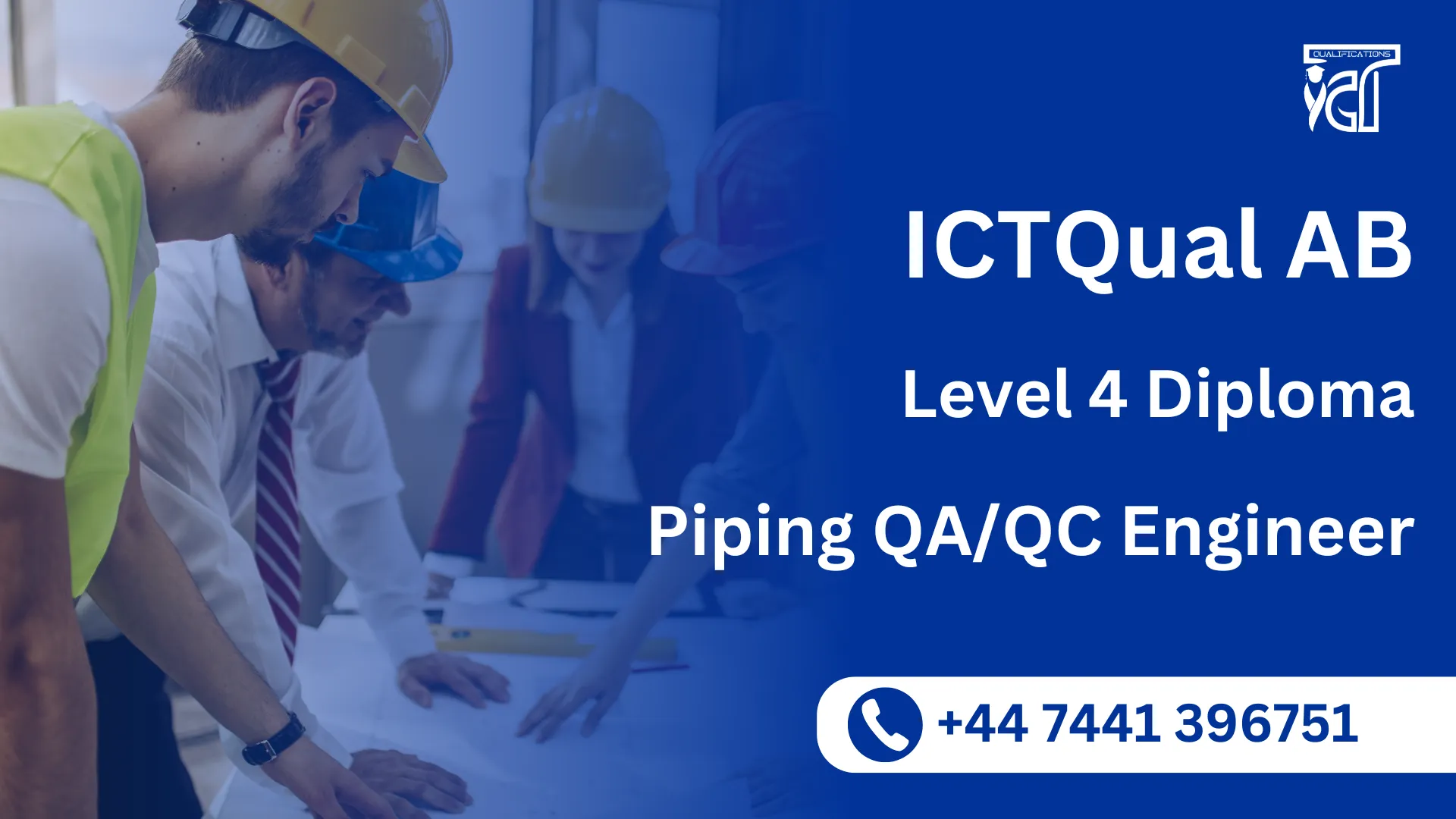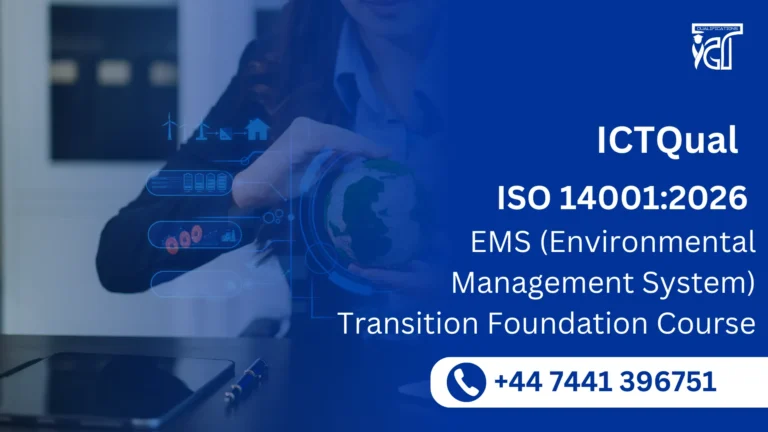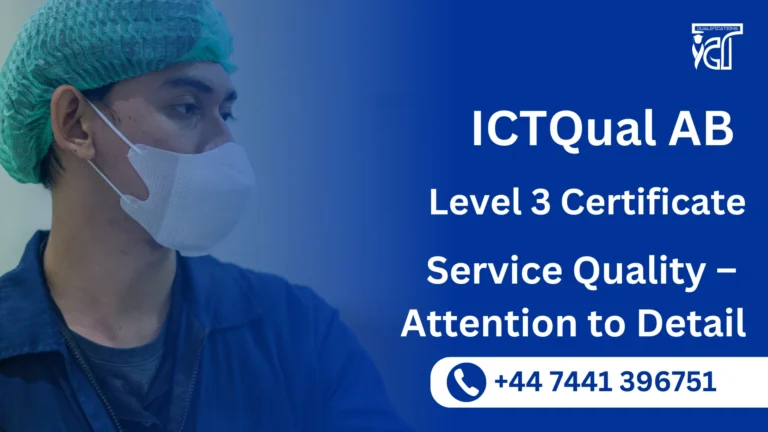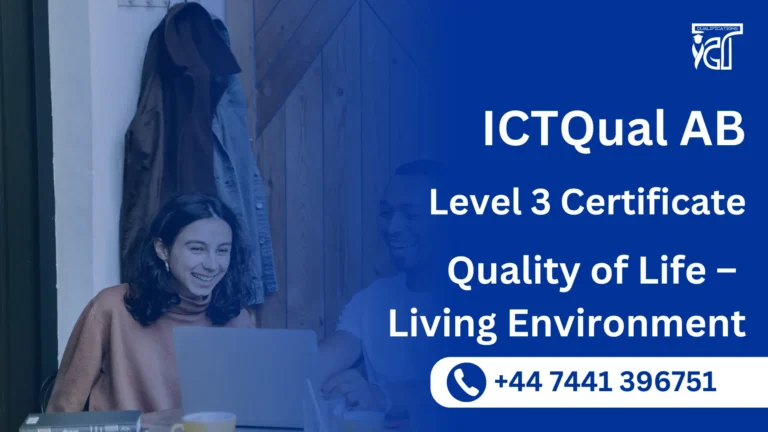The ICTQual AB Level 4 Diploma in Piping QA/QC Engineer is designed to provide learners with a solid foundation in quality assurance and quality control practices within the piping industry. This qualification introduces participants to the essential standards, inspection techniques, and engineering principles required to ensure the integrity, safety, and compliance of piping systems across industrial projects.
The program emphasizes practical knowledge of QA/QC processes, including material verification, welding inspection, non-destructive testing, and adherence to international codes and standards. Learners will gain the skills needed to identify defects, monitor construction quality, and support project teams in delivering reliable and compliant piping installations.
Tailored for individuals seeking to begin or strengthen their career in piping engineering, this diploma equips learners with both technical expertise and professional competencies. It fosters analytical thinking, attention to detail, and a commitment to safety and quality—qualities that are highly valued in industries such as oil and gas, petrochemicals, power generation, and construction.
Ultimately, the ICTQual AB Level 4 Diploma in Piping QA/QC Engineer serves as a stepping stone toward advanced qualifications and specialized roles. It prepares learners to progress into higher-level diplomas, supervisory positions, or technical engineering pathways, ensuring they are ready to contribute effectively to the global engineering and construction sector.
ICTQual AB Level 4 Diploma in Piping QA/QC Engineer
This qualification, the ICTQual AB Level 4 Diploma in Piping QA/QC Engineer, consists of 6 mandatory units.
| Sr# | Unit Title |
| 1 | Detailed Study of ASME and API Standards for Piping Systems |
| 2 | Advanced NDT Methods (Ultrasonic, Radiographic, Magnetic Particle) |
| 3 | Welding Procedure Specification (WPS), PQR and WPQ |
| 4 | Inspection and Quality Control During Fabrication and Erection |
| 5 | Quality Management Systems (QMS) and ISO 9001 Applications |
| 6 | Root Cause Analysis and Corrective Actions in QC |
Learning Outcomes for the Study Units:
Detailed Study of ASME and API Standards for Piping Systems
- Demonstrate a comprehensive understanding of key piping standards including ASME B31.3 and API 570, and their relevance to process piping systems .
- Apply these codes to assess compliance of piping design, material selection, fabrication, testing, and inspection procedures.
- Evaluate the implications of standard requirements on project quality control and safety assurance.
Advanced NDT Methods (Ultrasonic, Radiographic, Magnetic Particle)
- Explain the principles and applications of leading NDT techniques: ultrasonic testing (UT), radiographic testing (RT), and magnetic particle testing (MT) .
- Identify defects and interpret indications revealed by each method to assess material and weld integrity.
- Select appropriate NDT methods for specific inspection needs in piping systems and report findings accurately.
Welding Procedure Specification (WPS), PQR and WPQ
- Interpret the components and purpose of Welding Procedure Specifications (WPS), Procedure Qualification Records (PQR), and Welder Performance Qualification (WPQ).
- Evaluate the compliance of welding procedures and welder qualifications with project and regulatory requirements.
- Understand how these documents underpin consistent and reliable welding practices.
Inspection and Quality Control During Fabrication and Erection
- Develop inspection strategies to monitor fabrication and erection phases, ensuring alignment with technical specifications.
- Apply quality control techniques to detect non-conformities during construction and implement corrective actions.
- Coordinate inspection activities effectively within multidisciplinary project teams.
Quality Management Systems (QMS) and ISO 9001 Applications
- Demonstrate knowledge of ISO 9001 principles and how they support quality assurance in piping engineering projects.
- Apply QMS processes, such as internal audit, non-conformance tracking, corrective and preventive actions in inspection environments.
- Use ISO‑based frameworks to promote continuous quality improvement and operational consistency.
Root Cause Analysis and Corrective Actions in QC
- Apply structured root cause analysis techniques (e.g. 5 Whys, Fishbone diagrams) to identify reasons for QC failures.
- Develop and implement effective corrective and preventive action plans to resolve quality issues.
- Monitor the outcomes of interventions and adjust QC protocols to prevent recurrence.
The ICTQual AB Level 4 Diploma in Piping QA/QC Engineer provides learners with a strong foundation in quality assurance and quality control practices within the piping industry. It equips participants with technical knowledge, inspection skills, and professional competencies required to ensure safety, compliance, and reliability in industrial projects.
Skill Development
- Learn the fundamentals of QA/QC processes in piping engineering
- Gain knowledge of material verification and welding inspection techniques
- Understand non-destructive testing methods and their applications
- Develop familiarity with international codes, standards, and compliance requirements
- Build practical skills in identifying defects and ensuring construction quality
Career Preparation
- Prepare for entry-level roles such as QA/QC inspector or junior engineer
- Strengthen employability with a recognized international qualification
- Acquire transferable skills applicable across oil and gas, petrochemical, and construction industries
- Develop a portfolio of practical assignments and inspection reports
- Gain exposure to industry practices and project workflows
Professional Growth
- Enhance analytical and problem-solving skills for engineering quality control
- Improve attention to detail and accountability in professional practice
- Adapt to evolving industry standards and technological advancements
- Build awareness of safety protocols and risk management in piping projects
- Develop resilience and confidence in handling QA/QC responsibilities
Progression Opportunities
- Pathway to Level 5 and higher diplomas in piping QA/QC engineering
- Opportunity to specialize in advanced areas such as welding inspection or project quality management
- Foundation for supervisory and technical roles in engineering projects
- Support for career progression into senior QA/QC positions in global industries
The ICTQual AB Level 4 Diploma in Piping QA/QC Engineer is designed for learners who are beginning to establish themselves in the engineering and construction sectors. It suits individuals who want to build technical expertise in quality assurance and quality control practices while preparing for career growth in piping engineering.
Aspiring QA/QC Engineers
- Learners interested in developing foundational knowledge of QA/QC in piping projects
- Individuals motivated to understand inspection techniques, material verification, and compliance standards
- Candidates eager to contribute to safe and reliable piping installations
- Learners who want to strengthen technical and analytical skills for engineering roles
- Participants preparing for entry-level QA/QC inspector or junior engineer positions
Career Starters & Industry Entrants
- Early-career professionals seeking to specialize in piping QA/QC engineering
- Learners aiming to enhance employability in oil and gas, petrochemical, power generation, or construction industries
- Individuals with basic technical knowledge who want to progress into specialized QA/QC roles
- Candidates interested in building a portfolio of inspection reports and practical assignments
- Participants wishing to gain exposure to industry standards and project workflows
International Learners
- Learners seeking globally recognized qualifications for career mobility in engineering and construction
- Individuals motivated to understand international codes, standards, and compliance requirements
- Candidates aiming to adapt to diverse industrial environments and global project demands
- Participants committed to safety, quality, and ethical engineering practices
- Learners eager to engage with cross-cultural teams and international projects
Progression-Oriented Candidates
- Learners preparing to advance to Level 5 and higher diplomas in piping QA/QC engineering
- Individuals aspiring to specialize in advanced areas such as welding inspection or project quality management
- Candidates motivated to pursue supervisory or technical engineering roles
- Learners aiming to strengthen critical thinking and problem-solving skills for long-term career growth
- Participants who want to combine technical QA/QC expertise with leadership ambitions in engineering projects
The ICTQual AB Level 4 Diploma in Piping QA/QC Engineer provides learners with a strong foundation in inspection, compliance, and quality assurance practices. It serves as a stepping stone for both academic advancement and career development in engineering and construction industries.
Academic Progression
- Progression to ICTQual AB Level 5 Diploma in Piping QA/QC Engineering
- Opportunity to pursue specialized diplomas in welding inspection, non-destructive testing, or project quality management
- Foundation for higher-level qualifications in engineering management and industrial safety
- Eligibility to advance toward Level 6 and Level 7 programs in QA/QC engineering and leadership
- Support for continuous professional development aligned with international standards
Career Pathways
- Entry-level roles such as QA/QC inspector, junior engineer, or quality control technician
- Opportunities in oil and gas, petrochemical, power generation, and construction industries
- Roles in project quality monitoring, compliance auditing, and inspection reporting
- Freelance opportunities in inspection and consultancy services
- Foundation for progression into supervisory and technical engineering positions
Professional Growth
- Strengthen analytical and problem-solving skills for engineering quality assurance
- Develop expertise in applying international codes and standards to piping projects
- Build confidence in managing inspection processes and ensuring compliance
- Enhance adaptability to evolving industry technologies and practices
- Prepare for long-term career growth in global engineering and construction sectors
Entry Requirements
Learners must meet the following criteria to be considered for admission into the course:
- Age Requirement: Minimum age of 18 years or above
- Educational Background: Completion of a Level 3 qualification in engineering, construction, or a related technical field, or equivalent secondary education with strong technical aptitude
- Work Experience: At least 1–2 years of relevant industry experience in piping, mechanical, or construction projects is recommended. Candidates without formal experience may be considered if they demonstrate strong technical interest and commitment
- English Language Proficiency: Good command of spoken and written English is essential, as the program is delivered entirely in English. International learners may be asked to provide evidence of proficiency through recognized language tests (e.g., IELTS 5.0–5.5 or equivalent)
Register Now
Qualification Process
Qualification Process for the ICTQual AB Level 4 Diploma in Piping QA/QC Engineer
- Self-Assessment:
Begin by evaluating your eligibility to ensure you meet the qualification requirements, including work experience, knowledge, and language proficiency. - Registration:
Complete your registration by submitting the required documents, including a scanned copy of a valid ID, and paying the registration fee. - Induction:
An assessor will conduct an induction to confirm your eligibility for the course and explain the evidence requirements. If you do not meet the criteria, your registration will be cancelled, and the fee will be refunded. - Assignments & Evidence Submission:
Provide all assignments and the necessary evidence based on the assessment criteria outlined in the course. If you are unsure of the required evidence, consult with the assessor for guidance on the type and nature of evidence needed. - Feedback and Revision:
The assessor will review your submitted evidence and provide feedback. Evidence that meets the criteria will be marked as “Criteria Met,” while any gaps will be identified. You will be asked to revise and resubmit if needed. - Competence Evidence:
Submit final evidence demonstrating that all learning outcomes have been met. This evidence will be marked as “Criteria Met” by the assessor once it is satisfactory. - Internal Quality Assurance (IQA):
The Internal Quality Assurance Verifier (IQA) will review your evidence to ensure consistency, quality, and compliance with standards. - External Verification:
The IQA will submit your portfolio to ICTQUAL AB External Quality Assurance Verifiers (EQA) for final confirmation. The EQA may contact you directly to verify the authenticity of your evidence. - Certification:
Upon successful completion of all checks, ICTQUAL AB will issue your official certificate, confirming that you have attained the ICTQual AB Level 4 Diploma in Piping QA/QC Engineer







